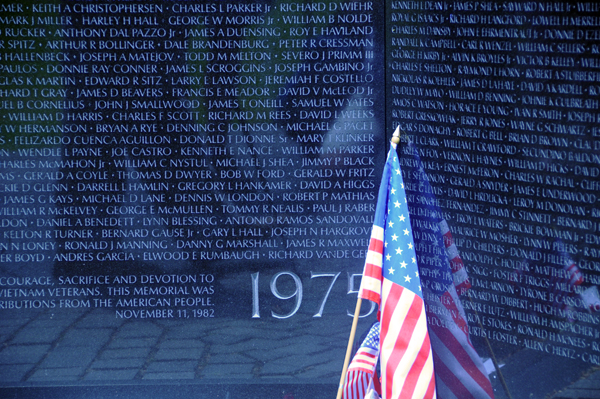Reflections on Memorial Day
The holiday weekend is about to begin. That extra day off makes it perfect opportunity for a mini-vacation or perhaps a family get-together.
With any one of countless "sales events," it might be a good time to shop for a car, or a dishwasher, or a pair of shoes.
Memorial Day unofficially kicks off the summer season. Woo hoo!
Wait a minute.... Is that what Memorial Day is all about? Shopping? A day off? Good times at the pool?
Of course there's nothing wrong with any of those things. What is wrong is the fact that this is what we now associate with Memorial Day. What was once a solemn observance has morphed into something else entirely. (For starters, it's no longer Memorial Day...it's Memorial Weekend.)
The following is a 1995 Memorial Day speech given at Robinson's Run Cemetery at McDonald, Pennsylvania by Lt. Colonel Joe Davis (U.S. Army).
What he had to say is even more true 16 years later. (This wasn't the work of a speechwriter; Davis penned the remarks himself.) It's short - and worth the read.
Most of us are familiar with the old adage, "Old soldiers never die, they just fade away". That saying is grossly untrue on two counts, and that is what I wish to comment upon for the next few minutes. First of all, old soldiers do die, often in combat; and so do young soldiers, and sailors, and marines, and airmen. Service members, young and old, men and women, from every branch of military service, die defending our country and our way of life. They fight in popular and unpopular wars, in countries all over the world. They carry the American flag, and the ideals and values for which it stands, to every corner of the world. They don't go for glory, or honor, or fame. They go because their duly elected officials, who represent the American people, including you and I, ask them to place themselves in harm's way. They sacrifice family, friends, and often their lives, to serve their country. The New Testament tells us that there is no greater love than to give your life for another. Our fallen comrades have demonstrated that love, and that is what Memorial Day is all about.
The second misconception is "that old soldiers just fade away". Our fallen comrades didn't fade away. In most cases, they were simply forgotten. One reason for this is that the true meaning of Memorial Day has been lost by the majority of the American people. To most Americans, Memorial Day is simply one of the federal holidays that bracket the summer season. Memorial Day for them marks the beginning of the summer, the opening of the community swimming pool, the start of a family vacation, the first barbecue of the year, or a much-needed three-day weekend. For the shopping malls and department stores, Memorial Day is an excuse for one more spectacular sales event. Others confuse Memorial Day for Veterans Day or Armed Forces Day, and although it is highly appropriate to honor all our veterans, living and dead, and to recognize their immeasurable contributions to our country, that is not the purpose of today's ceremonies.
Memorial Day is an annual holiday to honor all Armed Services personnel killed in wars in the defense of our country. It was originally called Decoration Day, and is traditionally marked by parades, memorial speeches, and the decoration of graves with flowers and flags. It was first observed on 30 May, 1868, for the purpose of decorating the graves of American Civil War dead. It was observed on 30 May until 1971, when most states adopted the newly established federal schedule for holiday observances. In recent times we have also included fallen policemen and firemen, and others who gave their lives in the performance of their duties to our society.
The forerunner of Memorial Day was born on 19 November, 1863, when President Abraham Lincoln came to Gettysburg, Pennsylvania, to help dedicate a new national cemetery to the brave soldiers who died in the battle that serves as the turning point of the Civil War. With your permission, I would like to read a portion of his now immortal address:
"We are met on a great battlefield of that war. We have come to dedicate a portion of that field as a final resting place for those who here gave their lives that that nation might live. It is altogether fitting and proper that we should do this.
"But, in a larger sense, we cannot dedicate - we cannot consecrate - we cannot hallow - this ground. The brave men, living and dead, who struggled here, have consecrated it, far above our poor power to add or detract. The world will little note, nor long remember what we say here, but it can never forget what they did here. It is for us the living, rather, to be dedicated here to the unfinished work which they who fought here have thus so nobly advanced. It is rather for us to be here dedicated to the great task remaining before us - that from these honored dead we take increased devotion to that cause for which they gave the last full measure of devotion - that we here highly resolve that theses dead shall not have died in vain - that this nation under God, shall have a new birth of freedom - and that government of the people, by the people, for the people, shall not perish from the earth."
Ladies and gentlemen, it is also fitting and proper that we gather here today to remember and honor those brave men and women who have given their lives that we might live in a free and prosperous United States of America. But in the same sense, it is impossible for us to do anything, or say anything, that can add to the honor that they so nobly earned. Rather, it is our solemn responsibility to remember them, and to give grateful thanks that when their nation called, they answered with their lives.
If President Lincoln were alive today, I believe he would be both amazed and disappointed, because his Gettysburg Address is better remembered that the fallen men to which he dedicated it. But there is still a spark of hope, because you are here today. You made time in your schedules to remember these brave men and women. General Robert E. Lee once said "It is well that war is so terrible---or we would become fond of it." The danger in not remembering the sacrifices made by these men and women, is that as a nation, we may forget that the price of freedom is never cheap. Your presence here today is a living example of what we as an American people should all be doing on this Memorial Day.
We are all shaped by our past experiences. My boyhood memories of Memorial Day weekends go back to the times that my family would travel back to our home church for a weekend of work and fellowship. We would all sit in an unairconditioned, one-room church, fanning feverishly with cardboard fans on popsicle sticks that were provided by the local funeral home. We sang gospel songs, had picnics on the grounds, and drank spring water from a tin cup. At one point in the weekend, everyone moved to the church cemetery, and we would spend several hours working on the graves of our families and friends. We hoed out weeds, cut the grass, repaired fences, straightened headstones, and planted fresh flowers on the graves. The work was not a burden, instead it united families and communities with their past. It is easy to remember your ancestors and their contributions, when you spend some time with them. Unfortunately, these practices have all but disappeared from today's culture.
In closing, I would like to encourage you to take a few moments to walk through the cemetery, and to visit the graves of our fallen service men and women. I assure you, there is no greater sense of gratitude than when you spend time personally reflecting on the sacrifices that these fallen comrades made for you and me.
Join the Christian Gift Community
Be the first to know about the latest news, new products, and exclusive specials by subscribing to our free newsletter.
Our privacy policy includes information on how we keep your data secure.

